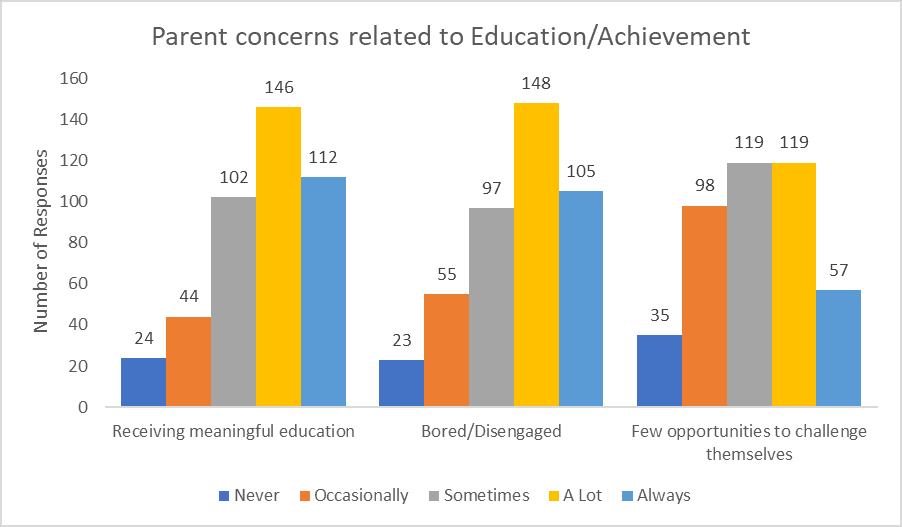Your super smart, inquisitive, intense gifted child had a passion for learning that was astonishing. They dove into whatever new interest consumed them and barely came up for air.
Then, school happened.
 |
| (Photo: Tony Tran/Unsplash) |
How do easy A's, limited academic enrichment, and hours of boredom affect our gifted children? Some of us have seen the impact, have lived it with our children, and have struggled with this seemingly insurmountable problem. We witness our child's disengagement, their loss of interest, their minimal effort, and watch helplessly as their drive for learning seems to vanish.
According to Jim Delisle, many gifted children are selective consumers who choose academic interests like a Sunday buffet. If they dislike the teacher or the topic, they don't bother to apply their abilities. Others are underachievers under-the-radar, a term I coined to describe gifted kids who boast reasonably good grades, keep out of trouble, and "look" successful. Teachers may assume their grades reflect effort, when in fact, these students cut corners and feel relieved about easily coasting through school without repercussions.
Of course, we know what happens to these kids. They eventually hit a wall when classwork gets harder or a boss takes them to task. By the time reality sets in, they are woefully unprepared to manage the challenge of demanding work. They often lack executive functioning skills (such as organization, time management, or study skills) and their self-confidence takes a hit when they realize that they need help or tutoring or time management support. Asking for help is anathema to them; they cannot imagine reaching out for support and feel shame about their struggles. Many retreat, drop that tough college class, or leave a job that is too challenging.
Results from an online survey of 428 parents of gifted children highlighted parents' concerns. Many worried "a lot" or "always" about whether their child would receive a meaningful education (60.2%), the impact of boredom and disengagement (59.1%), and the limited number of opportunities available where their children could challenge themselves (41.1%). (See the graph below.)
1. Ensure that a challenging academic environment is provided for all children (including gifted or twice-exceptional children) so that each child can learn in a manner consistent with their abilities. This, of course, assumes that school districts will invest in gifted programming and support teachers who require additional education about giftedness - something often lacking in their basic training. It also requires a philosophical shift where the needs of gifted children are taken seriously.
2. A range of cost-effective options, such as subject or grade acceleration, early kindergarten entry, ability grouping, or clustering gifted and highly able students together within classrooms are just a few of the options available. A recent commentary pointing to the drawbacks of lax grading policies is an example of the impact of low expectations; the author noted that students often calculated how they could expend the least amount of effort without completely failing. Of course, grades are not necessarily a good measure of a gifted student's engagement. But any policy that disincentivizes effort is sure to appeal to gifted kids who have already disengaged from the classroom.
3. Advocate for the necessity of gifted services within your school district and your State or Province. This includes arbitrary policy limitations districts impose regarding what they consider gifted education. When schools, for example, claim that gifted education does not start until third grade, or that gifted education merely involves a one-hour pull-out class, it often falls on parents to challenge these rules.
4. Insist on universal screening, which is more likely to identify gifted students who "don't look gifted." Those who are likely to be ignored include persons of color, students from impoverished backgrounds, rural residents, English Language Learners, or those with a competing twice-exceptional condition such as a learning disability that masks their giftedness.
5. Insist that your child pursue educational options that will support their love of learning and push them to expend effort and challenge themselves. These might include strategies for engaging their intrinsic motivation, participation in challenging extra-curricular activities or honors and AP classes, and opportunities for building resilience and executive functioning skills.
6. Pay close attention to your child's moods; signs of disengagement or hopelessness must be taken seriously. Disinterest in previously enjoyable activities, withdrawal from friends, irritability, and changes in appetite or sleep patterns can alert you to the need for additional intervention. Enlist the school or a licensed mental health professional for support.
The above comments offer just a few suggestions. Both parents and teachers are already juggling a lot. And when a gifted child coasts through school - and doesn't cause additional problems - the insidious effects of disengagement from learning might be overlooked. It falls on both parents and schools to take this seriously and ensure that gifted children receive the challenging education they need and deserve.
** For more insights about parenting gifted children, please see my new book, The Gifted Parenting Journey. Available through the publisher and the usual bookseller sites, this book addresses a previously neglected topic: the needs and emotional life of parents of gifted children. For more information about this book, snippets from editorial reviews, and upcoming workshops and book events, please see this link.**

No comments:
Post a Comment